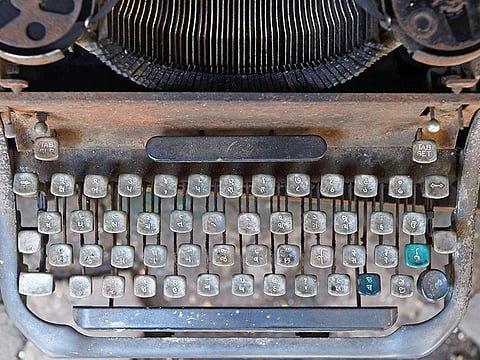Keeping pace with changing times and technology
During typewriter days, erasing a word meant a waste of time and a smudgy page

Also In This Package
Working on my laptop, when I remove some words by simply pressing the ‘Delete’ key, I am reminded of the typewriter days when erasing a word meant a waste of time and a smudgy page. But that was it.
After using the typewriter for 37 years of my journalistic career, I switched over to the computer after retirement. The transition was a thrilling experience and an occasion to compare the two eras.
Today, we remove any matter on a computer leaving no trace behind. However, it was different on a typewriter. We had to type ‘XXXX’ or some such letter over the wrong word. That led to a dirty copy, but that was a norm in the newspaper world. It was okay for the reporter, the desk and the compositors, but certainly not for our chief reporter. He believed in a neat and clean copy. So he would use the eraser and blow away the resultant shaving. That meant the loss of precious time, but he would produce a blemishless copy.
When a line had been typed out, the typewriter would give a clinking sound, commanding you to move a lever to advance the page. Today, the computer does it without bothering the user. You just keep typing ceaselessly. Since a copy of the typed matter was mandatory for office records, we had to struggle to fix one or more carbon papers into the typewriter’s roller.
Today, it is good riddance with the advent of the computer. But that should not tempt you to write an obituary of the good old typewriter.
No. It is very much alive, if not kicking, on the tables of the dwindling tribe of traditional petition writers who work in the hot, dusty and windy court compounds. Many have switched over to the laptop.
Nevertheless, some old generation people still keep their typewriters close to their chest as a souvenir of their younger days. At their age, they cannot work either on a typewriter or on a laptop.
In the 1990s, when a desktop was placed on my table, I got a bit nervous wondering some hand would come out of it to grab me by the collar. This typewriter user was pleasantly surprised when a technician demonstrated the desktop’s functioning. I was amused to learn that we may sweat out, but the PC must get the cosy comfort of an air conditioner.
Also Read: Confessions of a hackneyed homeschooling mum
Also Read: COVID-19 kept me too busy mopping
Also Read: When cooking is an adult’s joy
Also Read: Story of a tiny beautiful thing
Also Read: Slowly going crazy under lockdown
Happily, that era did not last long. The gadget started doing its job without the AC. The arrival of laptops swiftly elbowed out the bulky desktop from the desk.
Back in the 1960s, we had a few portable typewriters in our newspaper office to serve a team of about half a dozen reporters. There was naturally a scramble. Interestingly, due to the pressure on these machines, one of my senior colleagues invariably wrote his stories in his legible handwriting. Since his copy hardly needed any editing, it was carried in the original form.
The best thing about this newspaper office was the informal atmosphere. There was hardly any bossing which helped to groom freshers.
Even with scant resources and tough working conditions, our editorial team functioned in perfect harmony in keeping with the Lucknavi (Lucknow’s) culture. Some of the desk people, mainly the elderly, have been there for ages. They could not search for lucrative jobs because there were none.
They reconciled with the low wages and retired without a grumble. They believed in the saying, Ham fidaaye Lucknow, Lucknow hampe fida (I love Lucknow, and Lucknow loves me immensely).
A senior colleague, who spent all his life as a sub-editor, came to be known as ‘Mister 14 point’. The reason? He never gave a headline of more than size 14 font to a story even if it deserved a size 30 font.
Did it have anything to do with his life long stagnation?
— Lalit Raizada is a journalist based in India.







